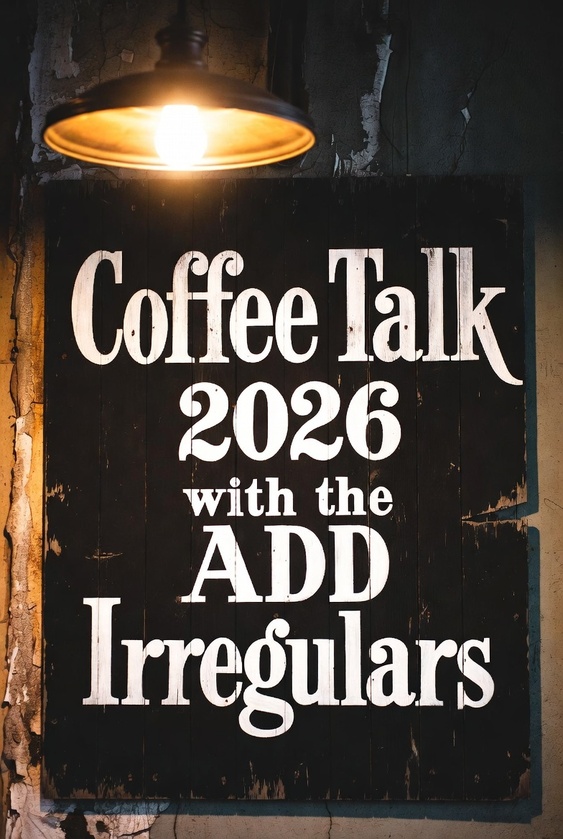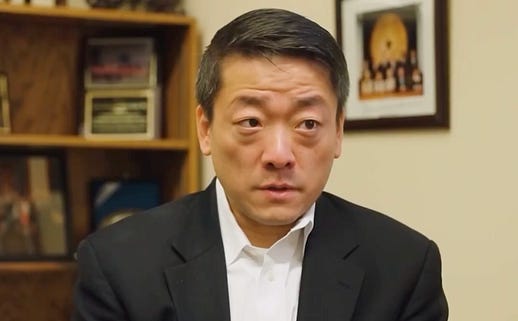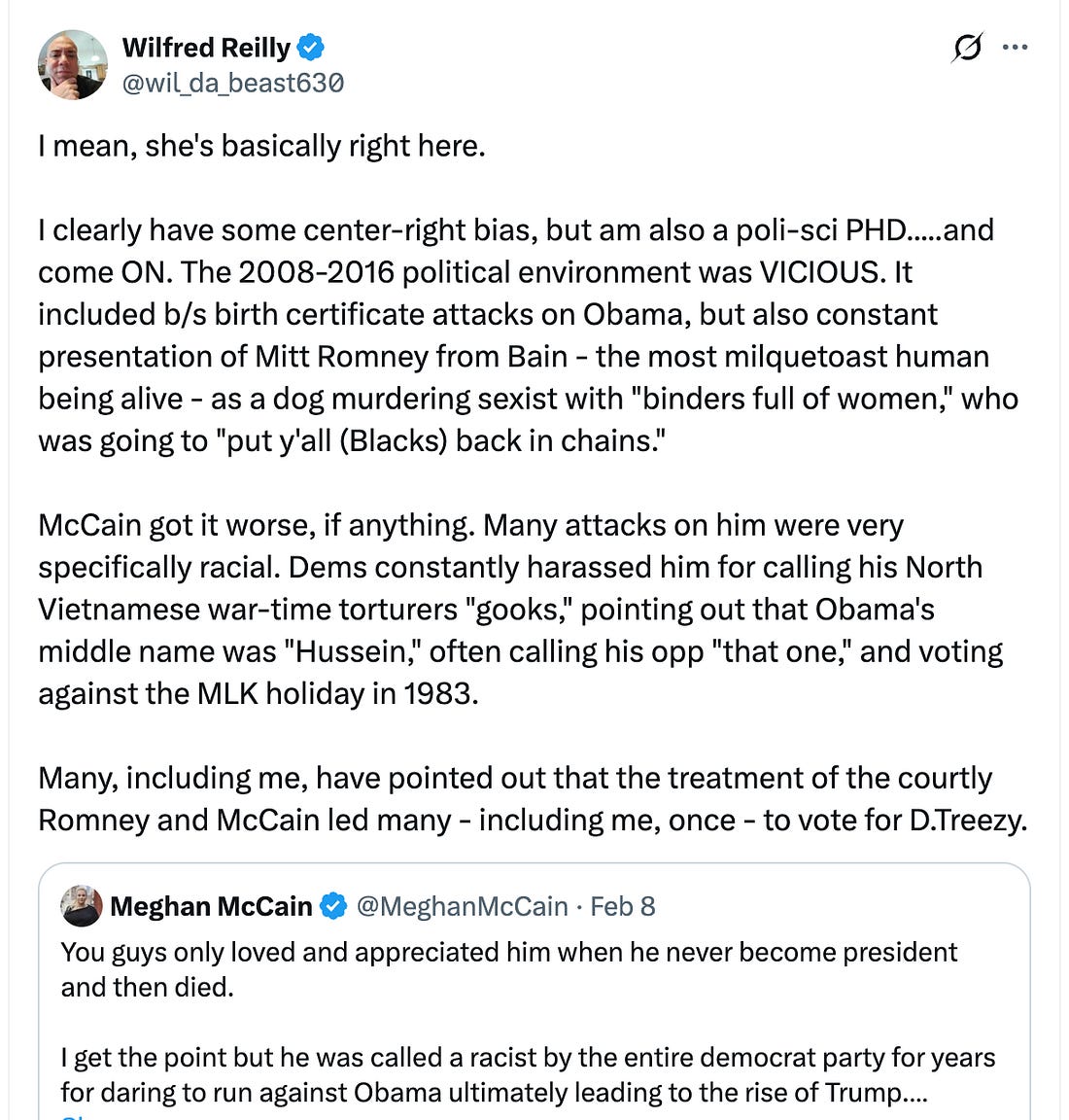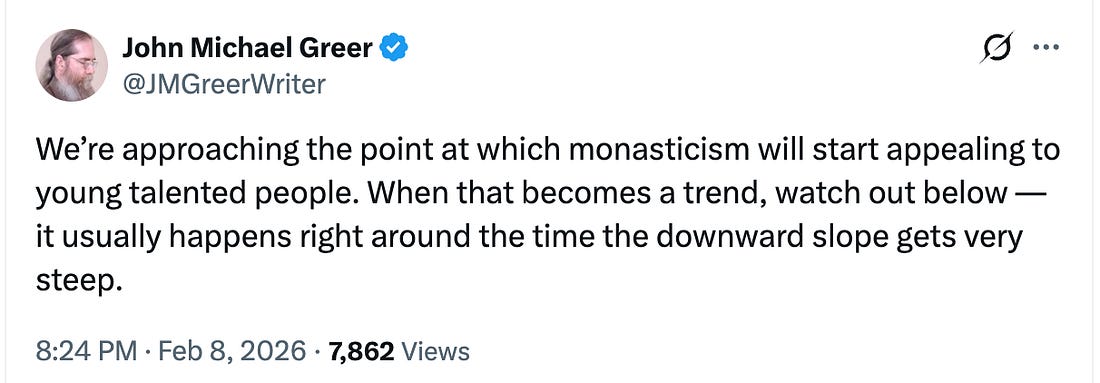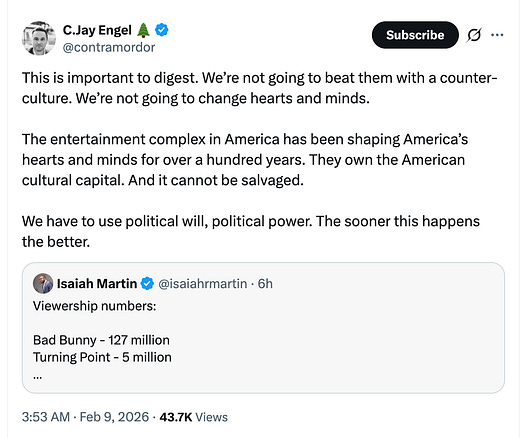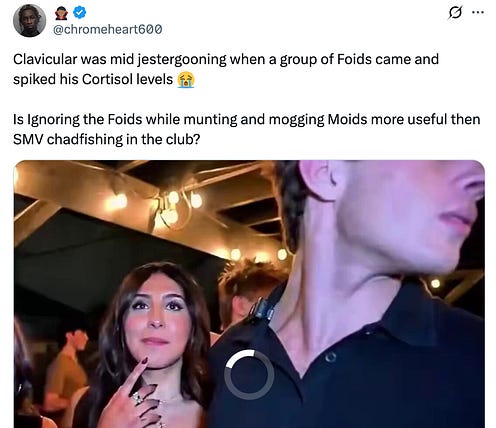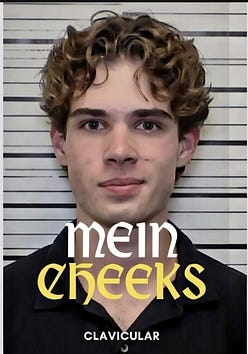 |
Marco Rubio's Munich Triumph
And: 'Gott Mit Uns'; Liberal Leaves Atheism; Why Is 'Anglo-Saxon' Bad? Tipi Loschi
|
 |
Secretary of State Marco Rubio really has emerged as the big talent in this administration. He went to the Munich Security Conference over the weekend and basically laid down the Team Trump line on Europe, but did it in a way that didn’t freak the Euros out. From the transcript:
Under President Trump, the United States of America will once again take on the task of renewal and restoration, driven by a vision of a future as proud, as sovereign, and as vital as our civilization’s past. And while we are prepared, if necessary, to do this alone, it is our preference and it is our hope to do this together with you, our friends here in Europe.
For the United States and Europe, we belong together. America was founded 250 years ago, but the roots began here on this continent long before. The man who settled and built the nation of my birth arrived on our shores carrying the memories and the traditions and the Christian faith of their ancestors as a sacred inheritance, an unbreakable link between the old world and the new.
We are part of one civilization – Western civilization. We are bound to one another by the deepest bonds that nations could share, forged by centuries of shared history, Christian faith, culture, heritage, language, ancestry, and the sacrifices our forefathers made together for the common civilization to which we have fallen heir.
And so this is why we Americans may sometimes come off as a little direct and urgent in our counsel. This is why President Trump demands seriousness and reciprocity from our friends here in Europe. The reason why, my friends, is because we care deeply. We care deeply about your future and ours. And if at times we disagree, our disagreements come from our profound sense of concern about a Europe with which we are connected – not just economically, not just militarily. We are connected spiritually and we are connected culturally. We want Europe to be strong. We believe that Europe must survive, because the two great wars of the last century serve for us as history’s constant reminder that ultimately, our destiny is and will always be intertwined with yours, because we know – (applause) – because we know that the fate of Europe will never be irrelevant to our own.
National security, which this conference is largely about, is not merely series of technical questions – how much we spend on defense or where, how we deploy it, these are important questions. They are. But they are not the fundamental one. The fundamental question we must answer at the outset is what exactly are we defending, because armies do not fight for abstractions. Armies fight for a people; armies fight for a nation. Armies fight for a way of life. And that is what we are defending: a great civilization that has every reason to be proud of its history, confident of its future, and aims to always be the master of its own economic and political destiny.
It was here in Europe where the ideas that planted the seeds of liberty that changed the world were born. It was here in Europe where the world – which gave the world the rule of law, the universities, and the scientific revolution. It was this continent that produced the genius of Mozart and Beethoven, of Dante and Shakespeare, of Michelangelo and Da Vinci, of the Beatles and the Rolling Stones. And this is the place where the vaulted ceilings of the Sistine Chapel and the towering spires of the great cathedral in Cologne, they testify not just to the greatness of our past or to a faith in God that inspired these marvels. They foreshadow the wonders that await us in our future. But only if we are unapologetic in our heritage and proud of this common inheritance can we together begin the work of envisioning and shaping our economic and our political future.
More:
But we must also gain control of our national borders. Controlling who and how many people enter our countries, this is not an expression of xenophobia. It is not hate. It is a fundamental act of national sovereignty. And the failure to do so is not just an abdication of one of our most basic duties owed to our people. It is an urgent threat to the fabric of our societies and the survival of our civilization itself.
And:
And this is why we do not want our allies to be weak, because that makes us weaker. We want allies who can defend themselves so that no adversary will ever be tempted to test our collective strength. This is why we do not want our allies to be shackled by guilt and shame. We want allies who are proud of their culture and of their heritage, who understand that we are heirs to the same great and noble civilization, and who, together with us, are willing and able to defend it.
And this is why we do not want allies to rationalize the broken status quo rather than reckon with what is necessary to fix it, for we in America have no interest in being polite and orderly caretakers of the West’s managed decline. We do not seek to separate, but to revitalize an old friendship and renew the greatest civilization in human history.
Boom! Read the whole thing — especially the part near the end in which Rubio speaks of what America owes to Europe. Exactly right, and delivered in what you might call love, not as an insult. I understand this was well received. I hope so. Everything Rubio said is true and vitally important.
It is hard to overstate how badly the president’s intemperate and insulting remarks have been received in Europe — and, the thing that concerns me the most, is how damaging they have been to the electoral prospects of nationalist-sovereigntist parties on the Continent. A prominent French conservative journalist lamented to me last week that with the French Right — the RN, not the squishy Right — having become the leading party in France, next year’s election will likely be fought over, incredibly, Donald Trump. As stupid as it sounds — as stupid as it actually is! — the emotional power of the figure of Trump over European voters is a real thing. It can’t be wished away. The president’s big mouth stands to do to all these parties — parties whose accession to government would dramatically be in America’s interest — what it did to poor Pierre Poilievre in Canada.
Don’t believe me? Read this essay by David Engels, a strongly nationalist, anti-migration conservative intellectual — the kind of right-wing thinker who initially welcomed Trump. Excerpts:
At first glance, Trump’s second presidency seemed to offer European conservatives the kind of vindication after years of marginalisation.
But:
… the Greenland affair and Trump’s bid to annex European territory were experienced as open aggression and an outright breach of confidence.
That matters because European electorates—especially those sceptical of Brussels—tolerate weakness in their own elites more readily than they tolerate a humiliation of their civilisation. Criticism of European bureaucrats may be more than welcome, but contempt for Europe as such gradually triggers a different reflex, as it wounds a collective pride that still lingers in a society otherwise resigned to decline.
It’s Poilievre 2.0: as sick as electorates might be of liberal governance, they cannot bear to be humiliated. Trump humiliated them. And for what? Naturally the reflex of voters is to lash back — and that’s going to hurt the kinds of political parties that Trump needs to be in power in Europe, if only for America’s national interest. Rubio’s speech went far, it seems, in repairing that breach.
Meanwhile, EU Commission president Ursula von der Leyen, also speaking at Munich, beat the drums of war with Russia. Quote from her speech:
We must make decisions faster. And this may mean relying on the result of a qualified majority rather than unanimity. We do not need to change the Treaty for this. We need to use the one we have. And we have to be creative.
Translation: Viktor Orban’s Hungary is the only one standing in the way of Europe declaring war on Russia. We will find a way around him.
The EU is hatching an unprecedented plan that could give Ukraine partial membership in the bloc as early as next year, as Brussels tries to shore up the country’s position in Europe and away from Moscow, according to 10 officials and diplomats.
Four years on from Russia’s full-scale invasion, and with Kyiv pushing for EU membership in 2027 to be included in a peace deal with the Kremlin, the early-stage idea would represent a dramatic change to the way the bloc brings new countries into the fold. The plan would see Ukraine getting a seat at the EU table before carrying out the reforms needed for full membership privileges.
April 12 is Election Day in Hungary. If Viktor Orban falls — and you can be sure all the efforts of European governments and intelligence agencies are pushing for that — then it is likely that the last obstacle to Ukraine’s entry into the EU will fall too. Orban’s opponent, Peter Magyar, has only said that if he wins, he will put it up to a national referendum in Hungary. But most Hungarians do not want Ukraine in the EU, not least because they know that means war with Russia. One expects that no matter how Hungarian voters feel, this will be an election that pro-Ukraine forces will “win.”
This is an extraordinarily dangerous moment for Europe. Bizarrely, its entire leadership class, save for Orban and some of his Central European allies, like Slovakia’s Robert Fico, are pushing hard for war with Russia. Why? What are they going to fight with? European militaries are weak. There is a lot of support among European publics for Ukraine in general, but I wonder what European voters will think if they are actually faced with the prospect of real live war on Ukraine’s behalf?
Balazs Orban, the Hungarian PM’s political director, tweeted the other day:
Brussels has made its objective clear: to defeat Russia on Ukrainian territory. Across Europe — with the exception of Hungary — war preparations are underway:
Conscription has been reintroduced in nine countries. In some, it now applies to women. Civil defense manuals are being distributed to households. Military spending has surged. Agreements have been signed about sending troops to Ukraine.
So far, Brussels has spent nearly €200 billion on the war. In December alone, it approved another €90 billion loan — backed by Member State guarantees.
And now:
€800 billion is demanded for “operations”
€700 billion for Ukraine’s army
Yet no one answers the most basic question: how do you defeat a nuclear power without triggering nuclear weapons?
Meanwhile, this report from the WSJ on a failed NATO military exercise is alarming:
Russia and Ukraine have shown the world the future of warfare—and America and its allies aren’t ready for it. That’s the lesson of a major exercise that North Atlantic Treaty Organization members conducted in Estonia last May. What transpired during the exercise, with the details reported here for the first time, exposed serious tactical shortcomings and vulnerabilities in high-intensity drone combat.
The exercise, known as Hedgehog 2025, involved more than 16,000 troops from 12 NATO countries who drilled alongside Ukrainian drone experts, including soldiers borrowed from the front line. It simulated a “contested and congested” battlefield with various kinds of drones, says Lt. Col. Arbo Probal, head of the unmanned systems program for the Estonian Defence Forces. “The aim was really to create friction, the stress for units, and the cognitive overload as soon as possible,” he says. That tests the soldiers’ ability to adapt under fire.
More:
A single team of some 10 Ukrainians, acting as the adversary, counterattacked the NATO forces. In about half a day they mock-destroyed 17 armored vehicles and conducted 30 “strikes” on other targets.
…Multiple sources told the story of one commander, who observed the drill and concluded, “We are f—.”
Look, the Ukraine war, which was brand-new the last time Orban ran for re-election (2022), was a big reason he won. Hungarians have no special love for Russia, which invaded their country infamously in 1956 to suppress an uprising, and which held it captive for over 40 years. But they understand what a war with Russia stands to do to their country, which is a lot closer to the front lines than France and Germany, and they don’t want it. They don’t understand why they should sacrifice their country for Ukraine, which is not even in NATO. And they’re right. Most Americans — probably most of my American readers, even — back Ukraine, but I ask you to consider how you would feel if you had to face Russian missiles and Russian drone swarms devastating your towns and cities. That’s what Europeans, especially those in what we used to call “Eastern Europe”, would face.
If Russia attacked NATO, then we would have no choice but to fight. But to bring Ukraine into the EU under these conditions, while not making it officially part of NATO, would be a distinction without practical difference. And if European militaries were to attack Russia, and Russia responded (as of course it would be compelled to), that means, under the terms of the NATO Treaty, that the US would have to respond militarily as part of its treaty obligations.
Are Americans ready for that? Because this is what’s coming.
‘Gott Mit Uns’: German Churches And World War I
There is nothing good about being flat on your back with mono, but I’m trying to make the best of it by reading, reading, reading. I read a couple of books about the role of religion in Germany during World War I, with an eye towards understanding how losing the war affected the religious sense of the German people in the 1920s. Philip Jenkins’s book The Great And Holy War is about how the Great Powers — all of them — sold the war to their publics as a sacred cause is a great resource. Jenkins points out that no country’s religious authorities did this more than Germany’s.
Historian Jason Crouthamel’s book Trauma, Religion and Spirituality in Germany during the First World War focuses exclusively on Germany. There was in Wilhelmine Germany a very close connection between the Protestant church and the state. But nearly all religious leaders, including Catholic ones, were behind the war effort in full force, characterizing it as a German Christian jihad. This nationalist idealism did not survive the trenches:
As the mass slaughter of industrialized warfare unfolded, and religious language became increasingly divorced from nationalistic conceptions of God as a force for courage, patriotism, and sacrifice, language about God focused on the capriciousness of life and death as well as God’s will and role in this irrational front experience. An interesting tension can be found in the correspondence between the home and combat fronts.
While men and women often struggled to exert agency through their imagination of God as a savior and protector, the sense that one did not actually have any control also pervaded letters and diaries. For many, God was not so much “with us,” as the dominant rhetoric promised. Rather, he seemed to be a remote, incomprehensible, and mysterious arbiter of a colossal, apocalyptic accident. The importance of fatalistic religious language has been analyzed by a number of historians because of its function as a coping mechanism for soldiers who struggled with an increasingly chaotic environment.
However, beyond its role as a coping mechanism, fatalistic thinking also signaled a shift to more personal and increasingly subjective thinking about religion. If God is remote and capricious, perhaps other spiritual-religious tools were needed to protect one from danger? The breakdown of the spirit of 1914 would lay the groundwork for religious experimentation, improvisation, and invention…
In the 1920s, that included a generalized weakening of faith in Christian authorities, the eventual Nazification of some on the Protestant side (because the loss of a war that had been sold as God’s Cause was psychologically unbearable), and an acceleration of pre-war interest in the occult.
In this past issue of this newsletter, I linked to a 1993 Fordham paper (no longer available online) about occultism in pre-Bolshevik and post-Bolshevik Russia points out, occultism rises in times of great national stress. More:
By the 1890s, the impersonality of the burgeoning cities, the perceived threat of mass democracy to culture and higher values, increasing class conflict and ethnic strife, combine d to foster rejection of liberalism, rationalism, materialism, and positivism by an ever growing number of artists and intellectuals . Occult ideas combined with radical political doctrines o f both left and right, with apocalypticism both Christian and secular, and with the anti-rationalist philosophies of Nietzsche, and to a lesser extent, of Bergson, fostered contempt for the “bourgeois values” of peace and prosperity.
These trends sprang forth with even greater vehemence after the Great War, and continued through the 1920s. Indeed, in the eyes of many people, including occultists, the Great War confirmed the bankruptcy of rational civilization. Occultists had a natural affinity for extreme political doctrines. That Naziism had occult roots is generally known, but occult doctrines and beliefs entered into Bolshevism and Stalinism as well, as we shall see. The Nazi mystique of blood and soil was bound up with Blavatsky’s idea that certain “root races,” in which she included Jews and Gypsies, were obsolete. She did not say that they should be exterminated, but some German occultists did. Some French occultists had demonized Jews as well . Just as the French Revolution was labelled a masonic conspiracy, the Bolshevik Revolution was attributed to a “Judeo-Masonic conspiracy.”
Note this:
For most of the 19th century, interest in the occult by the Russian elite was confined to a few circles, but in the 1880s the cultural climate began to change. The fading appeal of the official Orthodox Church, the spiritually unsatisfying atheism and positivism of the intelligentsia, the destabilizing impact of the rapid industrialization of the 1890s, political upheaval, cultural disintegration, and the association of rationalism and materialism with the West, combined to create a climate of personal confusion and religious quest which was receptive to the occult.
You would have thought occultism would have vanished under the reign of militant Bolshevik atheism. Nope, it just morphed:
Occultism was an element in Soviet culture as well. The line between magic and science disappeared in the utopianism of the early Soviet period . Hopes formerly invested in religion and magic were transferred to technology and science.
I believe we are seeing, and will continue to see, the same sort of transformation in post-Christian America — not just literal occultism, but a techno-futuristic form, likely associated with AI.
Over the weekend, I read an advance copy of Diana Pasulka’s forthcoming book, The Others. It won’t be out till summer, so I can’t write about it just yet. I have some disputes with the later chapters, but it is overall, I think, her most important book yet. And it deals in part with this very issue. I was startled and pleased to see the attention she gives to Arthur C. Clarke’s 1950s sci-fi classic Childhood’s End, which Pasulka — like me in this post from a year ago — sees as prophetic. I’ll return to this theme later this year, as we get closer to the release of Pasulka’s book.
How One Liberal Left Atheism
Here’s an interesting confession in the New Yorker by Christopher Beha, about how he left atheism to return to the Catholicism of his childhood. One big reason: he realized that liberalism cannot sustain itself without God. Excerpts:
Most people who subscribe to scientific materialism take it to be so obviously correct that it could not be denied by any rational person who truly understood it. But my reading showed me that this world view has its shortcomings. The most basic is perhaps inherent to any world view at all: it rests on a set of principles which often can’t be proven, even by the standards of proof the world view embraces. The general principle that all real knowledge is derived from sense perception of material facts cannot itself be derived from the perception of facts in the world, and thus can’t really be sanctioned by scientific materialism’s own methods. Indeed, no general principle can be. The very legitimacy of deriving general principles from the particulars of experience can never be established from experience without already having the principle in hand.
More:
After nearly twenty years of searching unsuccessfully for a livable atheist world view, I began, in my mid-thirties, to entertain the possibility that atheism itself might be part of the problem. There were many steps from here to my eventual return to robust belief, but I started with the notion that for me the authentic life might be one of faith—one that recognized the existence of both the external material world and the internal ideational world and sought to reconcile them, and one that accepted an absolute foundation to things and attempted to understand, in some provisional and imperfect way, the nature of this foundation and what it wanted from me.
He says that many on the postliberal Left and postliberal Right have succumbed to the illiberal Nietzschean view that politics is all about power:
Meanwhile, the failure of these traditions to respond adequately to the challenge is bound up with the problem identified by their earliest proponents: they have a very hard time articulating their foundational justification. When liberalism runs smoothly, it does a remarkable job delivering the goods it promises. For most people, this is a sufficient achievement to quiet any worries about its philosophical underpinnings. But when many people within liberal societies do not feel that the system is working, when the practical case for liberalism comes into question, secular liberals don’t have much else to go on.
Read it all. It is consonant with the liberal historian Tom Holland’s view that liberalism needs the Christian God.
Whatever Happened To Anglo-Saxons?
Paul Birch observes that in Britain, professional historians are now trying to erase the Anglo-Saxon founders of the nation from history. “The Anglo-Saxons were not the only makers of England, but they were the pivotal ones,” he says. Excerpt:
The intelligentsia’s discomfort is not about evidence. It is about implications. To acknowledge a foundational Anglo-Saxon ethno-cultural core is to concede that Britain, like every historic nation, emerged from particular peoples and not abstract processes. That continuity exists. That heritage has demographic as well as institutional roots.
But this jars with the governing worldview of the contemporary Anglophone elite, who prefer their respective nations to be framed as administrative constructs: fluid, interchangeable, and morally weightless. In that worldview, majority European ancestry is something to be obfuscated rather than championed. Foundational status implies legitimacy; legitimacy implies inheritance; inheritance implies boundaries. Thus, they have the incentive to rhetorically thin the founders out.
As ever, the American culture wars have further poisoned the well. In the United States, ‘Anglo-Saxon’ became entangled with critiques of ‘WASP power’ and racial hierarchy (the acronym ‘WASP’ stands for white Anglo-Saxon Protestant). Rather than disentangle historical terminology from modern political misuse, British institutions have imported this anxiety wholesale. The solution was not clarification but avoidance. If extremists misuse a term, the term must go.
If activists dislike a label, the label is retired. Historical precision becomes subordinate to reputational risk.
What makes the pattern unmistakable is its asymmetry. No campaign exists to rename the Roman Empire for fear of imperial associations. No one proposes retiring the word ‘Viking’ because of raiding ultra-violence. Indigenous ethnonyms worldwide are defended—quite rightly—as essential to cultural dignity. Only the Anglo-Saxons are deemed too dangerous to name. Sensitivity, it seems, only operates in one direction.
Why is it, he rightly wonders, that the only nations that are not allowed to celebrate their roots are European ones?
Life Lessons From The Tipi Loschi
An American Catholic Substacker named Abigail lived with my dear Italian friends the Tipi Loschi — the Catholic community in San Benedetto del Tronto, featured prominently in The Benedict Option — and writes here about some things she learned about community. Excerpt:
After my first year of college I had the distinct and life altering privilege to spend several years (broken up into several different trips) living and working in a Catholic lay community dedicated to Saint Pier Giorgio Frassati in Italy. I hit the tarmac at Fiumicino a few weeks before I turned twenty, and spoke only enough Italian to get on the right bus and order a coffee. I was living with a host family and working at the school that the community ran - I was overwhelmed, I was in love with and at odds with the lifestyle almost immediately. It was an incredible experience for which I will always be very grateful, and brought into focus for me a sort of community living that I’d never seen before. I would not be able to give a proper synthesis of all the varied goals of this community - they are out there living in a very radical and very ordinary way, an intentional lay community now on its third generation. While many of the families live near each other, most do not live in any sort of common area (though there is a property that everyone tends to and gathers at frequently) and some are spread out farther from the city center than others - they were just very intentional about meeting together, working together, going to Mass together, etc. They have founded a school, a cooperative, a recycling center, a print shop, and many more initiatives that both serve their community and employ their members. It is their goal that life ought not be done alone, that work and prayer and leisure and suffering are meant to be done in tandem with other friends, for the greater glory of God and for the betterment of neighbor, and thus society.
Most everyone in the community knew everyone else, (when I was there this was easily 150+ people) and newcomers became known quantities very rapidly. People’s triumphs and struggles were much more in the open than we are used to as Americans. Health issues, romantic lives, finances, disappointments and dreams were all much more on the table for everyone to see and understand. I had never and have never since experienced a sort of holistic community where the people I prayed were also the people I ate with, worked with, partied with, and argued with. It was glorious and uncomfortable - not without its own downsides, of course, and several times my American privacy sensibilities were more than a little violated. Why are you trying to do this task alone? Why don’t we have Laura help you? Are you volunteering for this only to spend more time with that boy? You shouldn’t be eating dinner alone - go to Chiara’s house, ask her if you can help cook.
That first year in particular was a lesson for me that to be in community means to be vulnerable, and to an American who is used to doing things completely alone and independently, a community at first can feel like a limiting factor. Part of the choice to begin facilitating a village is to commit to doing things with other people even if it not the most expedient or convenient thing in the world, and to swallow your pride and admit in the public sphere that you cannot do everything alone.
I’m telling you, if I were Catholic, or if there were an Orthodox parish in or near San Benedetto del Tronto, I would pick up and relocate there to share the lives of these great and generous Christians. It’s not easy to get to San Benedetto — it’s rather inconveniently located on Italy’s Adriatic Coast — but if you want to see what the good life in Christian community is like, you should pay them a visit.
A Proud Israeli Christian
Shadi Khalloul has some words for Tucker Qatarlson. He quotes Tucker here:
But if the deeper question is, “Where do Christians feel more comfortable in Qatar or Israel?”, I mean, it’s sort of hard to know what people actually think. So maybe the best way to measure that is by where they live. So there are twice as many Christians living in Qatar as there are in Israel. Twice as many. At least twice as many. Did you know that?
And Khalloul responds:
Yes, there are roughly twice as many Christians in Qatar as in Israel — about 400,000 versus 188,000. But let’s get the facts straight. The Christians living in Qatar are almost entirely migrant workers, people who have no legal rights as citizens.
...There are exactly six government-sanctioned churches in Qatar. Six churches serving hundreds of thousands of people. And to make it even worse, they are all right next to each other under the close supervision of the government.
To be clear, it is illegal for Qatari citizens to convert from Islam to Christianity, and Qataris are not allowed to enter Christian churches. In fact, every person entering a church in Qatar must submit an ID.
The migrant workers who do attend often live and work under conditions that have been widely condemned as modern-day slavery.
Contrast that with Israel, a country where Christians are fully recognized citizens, including my community of indigenous Aramean Maronite Christians. We vote, we serve in the military, and we even hold elected office in the Knesset. Israel’s Christians are not confined to a single gated area or monitored by state authorities. We are free to worship openly, participate in society, and contribute to the nation’s cultural and political life.
There are more Baptist churches in Israel (17) than there are total churches in Qatar. In fact, Israel is the only country in the Middle East where the native Christian communities are growing. Carlson took the only possible data points to show anything positive about Christian existence in Qatar and still got it all wrong.
Human Rights Campaign Shakedown In Retreat
In Live Not By Lies, I wrote about how the powerful LGBT lobby Human Rights Campaign enforces woke loyalty over corporations, who bend over backwards (ahem) to stay in its good graces. Tyler O’Neil reports that that has changed. Excerpt:
The Human Rights Campaign has long employed mafia-like tactics to pressure companies to toe the line on gender ideology, but a growing chorus of critics, assisted by President Donald Trump’s second administration, has led companies to reconsider their alliances with the organization.
About three-quarters of all Fortune 500 companies (377) disclosed their business practices to HRC in 2025, so the LGBTQ activist group could rate them on its Corporate Equality Index. This year, however, only 131 companies are working with HRC—a 65% drop.
This represents a massive hit to the transgender industrial complex, but conservatives shouldn’t rest on their laurels. In the very press release where HRC admits its massive losses, it touts its abiding impact: the companies still working with HRC employ over 22 million Americans.
Good news — but the fight is still on. It appears that rather than taking its stunning gay rights victories and going home, the HRC overextended itself by taking up the unpopular transgender cause, and is paying a price. Not yet enough of one!




